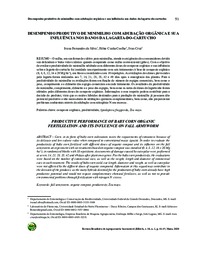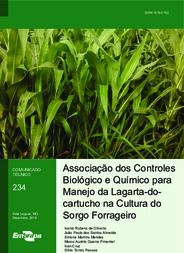Bio-pesticide is the result of a partnership between Embrapa and the Swiss group Andermatt Biocontrol, launched worldwide. New product is 100% lethal to fall armyworm in experiments and is harmless to other insects (natural enemies), plants and humans. Price is just over 70 reais per hectare, which is equivalent to half a sack of soybeans or 75% of a sack of corn (quotations for the first half of June). Product can be used in corn, soybeans, sorghum, and cotton, besides pastures and vegetables. Fall armyworm (Spodoptera frugiperda) is the main corn pest and can reduce production by more than 50%. Spraying tests using drones on soybeans and cotton will be initiated. Embrapa and the Swiss company Andermatt Biocontrol have developed a biological product capable of killing 100% of the fall armyworm (Spodoptera frugiperda) population. Spodovir is a commercial bio-insecticide that has in its composition a virus that infects the pest and poses no risk to human health or the environment. This is because its basis is a baculovirus, a type of virus that only kills insects and does not harm microorganisms, plants, mammals, or vertebrates. Spodovir will be the first global launch of a biological product with Embrapa technology, as it was developed in partnership with a private company that operates in several countries. The product was registered with the Ministry of Agriculture, Livestock and Food Supply of Brazil for the control of fall armyworm, Spodoptera frugiperda, the most harmful corn pest, capable of reducing the production of this crop by more than 50%. Spodovir can also be used in different crops, such as soybeans, sorghum, cotton, rice, pastures, and vegetables. “The main advantage of this biological product, also called bio-pesticide, is that it does not affect the environment, it does not intoxicate appliers, it does not kill the natural enemies of pests (beneficial insects), it does not pollute rivers and springs and it does not leave residue in the food to be sold to consumers, contributing to sustainability and quality of the products available”, emphasizes the researcher from Embrapa Maize and Sorghum Fernando Hercos Valicente, developer and responsible for the technology at the company. Baculovirus-based bio-pesticides work best when caterpillars are small, from newborns to when they are a maximum of one centimeter long, in the case of fall armyworm. “The positioning of Spodovir in the field is essential to cause the intended mortality and it depends on the region and the beginning of the pest attack”, analyzes the scientist, stressing that the 100% effectiveness of the product reached in experiments was also the result of its correct application. Valicente (right) emphasizes that Spodovir must be ingested to take effect; that is, the product must be eaten by the insects. “Thus, the spraying must consider this factor (ingestion by the insect) and the operation needs to be well done. Baculoviruses have no contact action. Applications can be made at ULV (ultra-low volume), provided that the proper equipment is used. Tests on spraying with drones on soybeans and cotton will be initiated”, announces the researcher. Spodovir should be applied, when possible, after 4 pm, a period with lower incidence of ultraviolet (UV) rays, which deactivate viral particles of the product in field. Another reason is that fall armyworm has nocturnal habits, starting its feeding in the early evening. “If spraying is done in the late afternoon, there will be no deactivation of viral particles (because there is no UV radiation) and the caterpillars will consume the baculovirus that was sprayed on the crop, by scraping the leaves, causing the death of these insects”, explains the researcher , stressing that the application must be adjusted to the needs and size of the crop and according to the logistics of the farm. Cost per hectare is lower than 50% of the price for a sack of soybeans Spodovir is the result of a partnership signed in 2015 between Embrapa and the Andermatt Group. “After several tests carried out in our laboratories, we verified that the product had excellent efficacy, which encouraged the company to establish the partnership with Embrapa”, says Andermatt Biocontrol Brasil’s CEO, Markus Ritter. Agronomist engineer Viviane Dutra (right), responsible for the management of Andermatt Brasil, says that the cost of one application of the product per hectare would be approximately 0.75 sack of corn (considering, for example, the price of a sack of this cereal on June 10 at 96.57 reais, the corn grower would spend 72.42 reais per hectare). Besides, the cost to use Spodovir is equivalent to 0.45 sack of soybean (at a price of 167.62 reais on June 10). Thus, soybean growers would spend 75.42 reais per hectare to use the product. The manager explains that the Spodovir production process takes place entirely in Canada, in one of Andermatt’s units specialized in the production and formulation of baculovirus. “Our virus production and multiplication process is very judicious. The team has great expertise with this type of microorganism, which gives the product high quality”, she highlights. About the formulation of the biological product, Viviane Dutra reports that it has high solubility, is easily tank mixed and does not form sediments. “In all the tests, Spodovir had a performance that was equal to or superior to the products already used to control the pest. We believe that the bio-pesticide will have an excellent acceptance by farmers, since it is highly effective, and the Brazilian farmers are already used to using biological products”, bets the manager. According to her, the Andermatt Group’s experience in the production of microbiological products associated with Embrapa’s knowledge will be a success. “We can meet the needs of farmers in a sustainable way, without impacting the environment, workers and consumers”, says Dutra, noting that Spodovir can compose Integrated Pest Management (IPM) actions, with advantages over chemical insecticides. Markus Ritter (left) states that the expectation of Andermatt is that the sales will meet the demand of farmers right in the first months of the corn cropping season. “Our goal is to bring solutions to the different profiles of farmers, regardless of the size of their property or how they manage their crops. We are ready to serve all audiences, from family smallholders to large business groups”, says the executive. Research development: years of dedication The identification of efficient baculovirus isolates, which act against Spodoptera frugiperda, began in the 1980s, when researchers started collecting caterpillars and carrying out surveys to identify diseased insects. “In order to produce a baculovirus-based insecticide, caterpillars must be collected in the field, and those that have symptoms of infection must be isolated and studied, one by one, in contrast with healthy caterpillars. The best isolates are dealt with and characterized in the laboratory using gene sequencing tools when necessary. The characterization of the isolates leads to the choice of the best strains and these ones will be worked on in terms of pilot production, formulation of the biological product, and field experiments”, reports Fernando Valicente. According to him, all the studies enabled the obtention of parameters for production. Healthy laboratory-bred caterpillars are used as hosts to multiply the virus and generate the product. “It’s been years of dedication, investment in research, laboratory experiments and field tests to make the product viable”, says the researcher. He says symptoms of baculovirus infection in caterpillars start with loss of appetite, reduced mobility, body discoloration, and finally death (picture above). In addition to its efficiency, the technology’s differentials are the low number of applications and the preservation of water sources and the pest natural enemies. How to use Spodovir Spodovir is sold in a wettable powder formulation, with a recommendation of 50 grams per hectare. Markus Ritter affirms that Andermatt has enough stock to cover 18,000 hectares in this first phase. According to him, the factory in Canada is fully operational and new volumes of the product will be imported. Following the dosage recommendation, one kilo of the product is enough for 20 hectares. The recommendation is to use Spodovir with a flat nozzle and the flow rate approved for conventional spraying between 100 liters to 120 liters per hectare, which can reach 150 liters per hectare and a minimum of 80 liters per hectare. Every application must include an adhesive spreader to improve the product adherence to the sprayed leaves, ensuring that the solution’s pH is between 5 and 7.2. There are spreaders in the market that maintain the pH of the mixture within this range, which facilitates its application in cotton crops. The technicians emphasize the abovementioned observations: it is important that the application considers the way the product works, i.e. ingestion by insects. Therefore, the ideal time for application is from 4 pm, when there is lower incidence of ultraviolet rays (which affect the bio-product), which prepares the leaves for the fall armyworm, which feeds at night. Spodovir What it is: Baculovirus-based biological product registered for the control of fall armyworm, Spodoptera frugiperda Where to find it: Andermatt Group Brasil - Curitiba, State of Paraná Phone numbers: +55 41 99113-8703 | +55 41 99164-7334 E-mail: info@andermatt.com.br Site: https://andermatt.com.br/ Grupo Andermatt Andermatt Biocontrol was created in Switzerland in 1988 aiming to offer biological alternatives for agriculture. The Andermatt Group is currently present in over 60 countries and is represented by branches, partners, or distributors. The group has a portfolio of more than 30 products. Headquartered in Curitiba, State of Paraná, Andermatt Brasil was created in 2014. Learn more about Embrapa’s Technology: Approved products - Ministry of Agriculture, Livestock and Supply website
Photo: Divulgação
![Divulgação - The bio-pesticide is safe for the environment and for human applicators, preserves beneficial insects and does not leave residues in food. Divulgação - The bio-pesticide is safe for the environment and for human applicators, preserves beneficial insects and does not leave residues in food.]()
The bio-pesticide is safe for the environment and for human applicators, preserves beneficial insects and does not leave residues in food.
-
Bio-pesticide is the result of a partnership between Embrapa and the Swiss group Andermatt Biocontrol, launched worldwide. -
New product is 100% lethal to fall armyworm in experiments and is harmless to other insects (natural enemies), plants and humans. -
Price is just over 70 reais per hectare, which is equivalent to half a sack of soybeans or 75% of a sack of corn (quotations for the first half of June). -
Product can be used in corn, soybeans, sorghum, and cotton, besides pastures and vegetables. -
Fall armyworm (Spodoptera frugiperda) is the main corn pest and can reduce production by more than 50%. -
Spraying tests using drones on soybeans and cotton will be initiated. |
Embrapa and the Swiss company Andermatt Biocontrol have developed a biological product capable of killing 100% of the fall armyworm (Spodoptera frugiperda) population. Spodovir is a commercial bio-insecticide that has in its composition a virus that infects the pest and poses no risk to human health or the environment. This is because its basis is a baculovirus, a type of virus that only kills insects and does not harm microorganisms, plants, mammals, or vertebrates.
Spodovir will be the first global launch of a biological product with Embrapa technology, as it was developed in partnership with a private company that operates in several countries. The product was registered with the Ministry of Agriculture, Livestock and Food Supply of Brazil for the control of fall armyworm, Spodoptera frugiperda, the most harmful corn pest, capable of reducing the production of this crop by more than 50%. Spodovir can also be used in different crops, such as soybeans, sorghum, cotton, rice, pastures, and vegetables.
“The main advantage of this biological product, also called bio-pesticide, is that it does not affect the environment, it does not intoxicate appliers, it does not kill the natural enemies of pests (beneficial insects), it does not pollute rivers and springs and it does not leave residue in the food to be sold to consumers, contributing to sustainability and quality of the products available”, emphasizes the researcher from Embrapa Maize and Sorghum Fernando Hercos Valicente, developer and responsible for the technology at the company.
Baculovirus-based bio-pesticides work best when caterpillars are small, from newborns to when they are a maximum of one centimeter long, in the case of fall armyworm. “The positioning of Spodovir in the field is essential to cause the intended mortality and it depends on the region and the beginning of the pest attack”, analyzes the scientist, stressing that the 100% effectiveness of the product reached in experiments was also the result of its correct application.
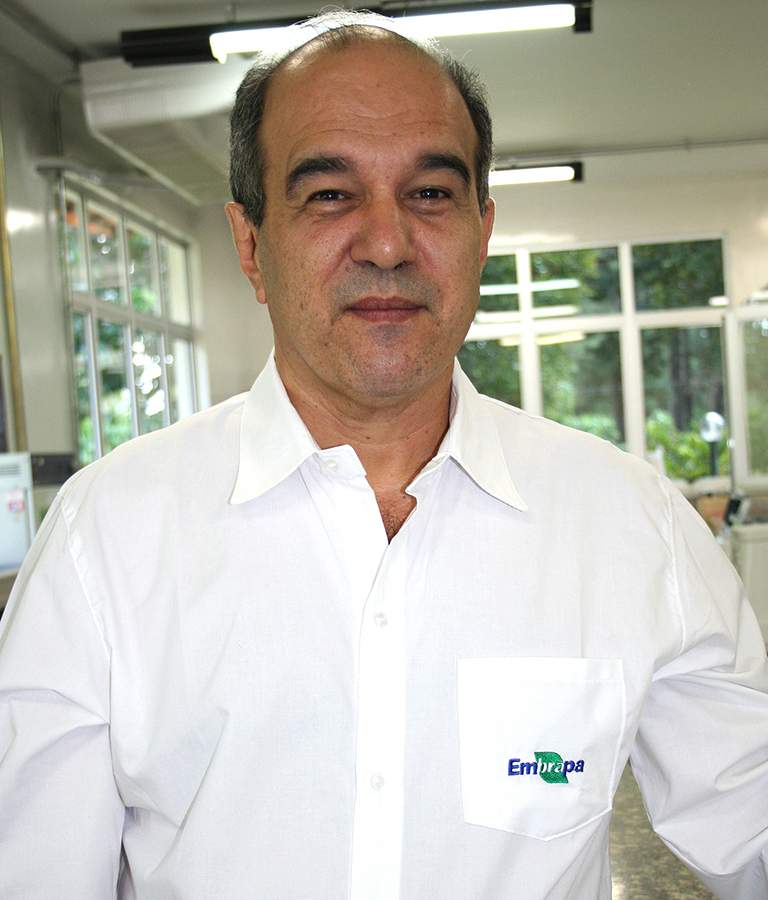
Valicente (right) emphasizes that Spodovir must be ingested to take effect; that is, the product must be eaten by the insects. “Thus, the spraying must consider this factor (ingestion by the insect) and the operation needs to be well done. Baculoviruses have no contact action. Applications can be made at ULV (ultra-low volume), provided that the proper equipment is used. Tests on spraying with drones on soybeans and cotton will be initiated”, announces the researcher.
Spodovir should be applied, when possible, after 4 pm, a period with lower incidence of ultraviolet (UV) rays, which deactivate viral particles of the product in field. Another reason is that fall armyworm has nocturnal habits, starting its feeding in the early evening. “If spraying is done in the late afternoon, there will be no deactivation of viral particles (because there is no UV radiation) and the caterpillars will consume the baculovirus that was sprayed on the crop, by scraping the leaves, causing the death of these insects”, explains the researcher , stressing that the application must be adjusted to the needs and size of the crop and according to the logistics of the farm.
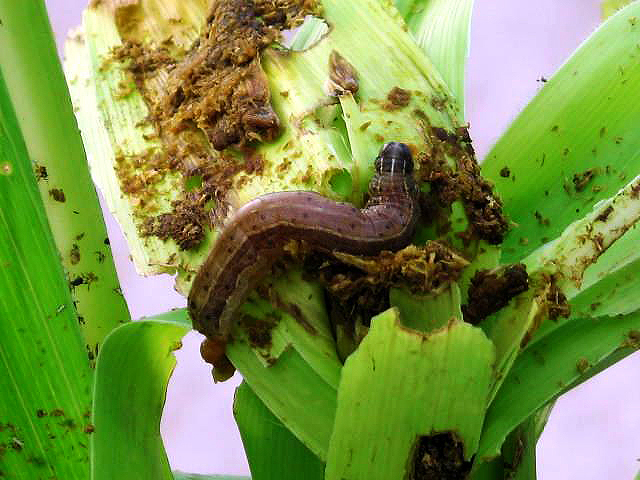
Cost per hectare is lower than 50% of the price for a sack of soybeans
Spodovir is the result of a partnership signed in 2015 between Embrapa and the Andermatt Group. “After several tests carried out in our laboratories, we verified that the product had excellent efficacy, which encouraged the company to establish the partnership with Embrapa”, says Andermatt Biocontrol Brasil’s CEO, Markus Ritter.
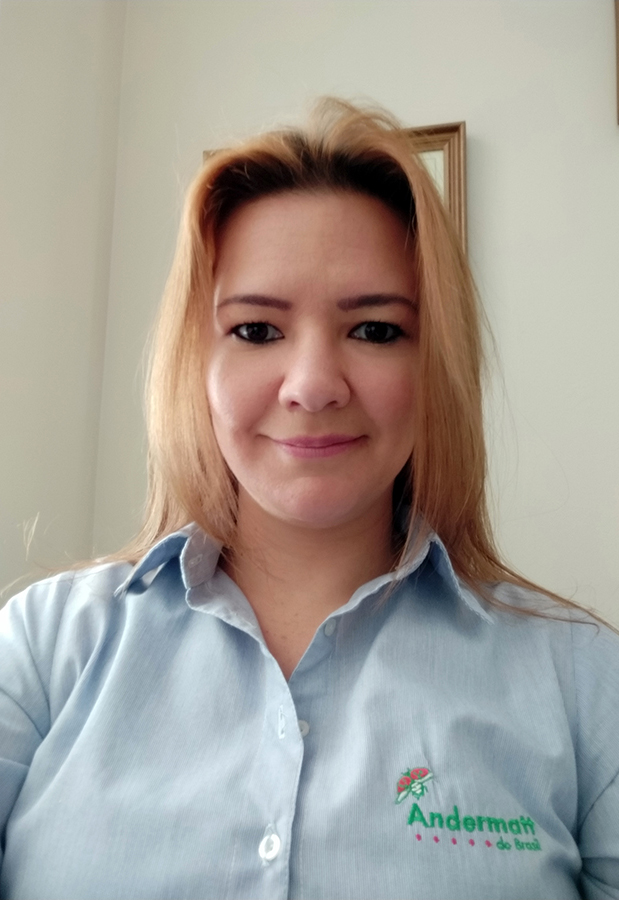 Agronomist engineer Viviane Dutra (right), responsible for the management of Andermatt Brasil, says that the cost of one application of the product per hectare would be approximately 0.75 sack of corn (considering, for example, the price of a sack of this cereal on June 10 at 96.57 reais, the corn grower would spend 72.42 reais per hectare). Besides, the cost to use Spodovir is equivalent to 0.45 sack of soybean (at a price of 167.62 reais on June 10). Thus, soybean growers would spend 75.42 reais per hectare to use the product.
Agronomist engineer Viviane Dutra (right), responsible for the management of Andermatt Brasil, says that the cost of one application of the product per hectare would be approximately 0.75 sack of corn (considering, for example, the price of a sack of this cereal on June 10 at 96.57 reais, the corn grower would spend 72.42 reais per hectare). Besides, the cost to use Spodovir is equivalent to 0.45 sack of soybean (at a price of 167.62 reais on June 10). Thus, soybean growers would spend 75.42 reais per hectare to use the product.
The manager explains that the Spodovir production process takes place entirely in Canada, in one of Andermatt’s units specialized in the production and formulation of baculovirus. “Our virus production and multiplication process is very judicious. The team has great expertise with this type of microorganism, which gives the product high quality”, she highlights.
About the formulation of the biological product, Viviane Dutra reports that it has high solubility, is easily tank mixed and does not form sediments. “In all the tests, Spodovir had a performance that was equal to or superior to the products already used to control the pest. We believe that the bio-pesticide will have an excellent acceptance by farmers, since it is highly effective, and the Brazilian farmers are already used to using biological products”, bets the manager.
According to her, the Andermatt Group’s experience in the production of microbiological products associated with Embrapa’s knowledge will be a success. “We can meet the needs of farmers in a sustainable way, without impacting the environment, workers and consumers”, says Dutra, noting that Spodovir can compose Integrated Pest Management (IPM) actions, with advantages over chemical insecticides.
Markus Ritter (left) states that the expectation of Andermatt is that the sales will meet the demand of farmers right in the first months of the corn cropping season. “Our goal is to bring solutions to the different profiles of farmers, regardless of the size of their property or how they manage their crops. We are ready to serve all audiences, from family smallholders to large business groups”, says the executive.
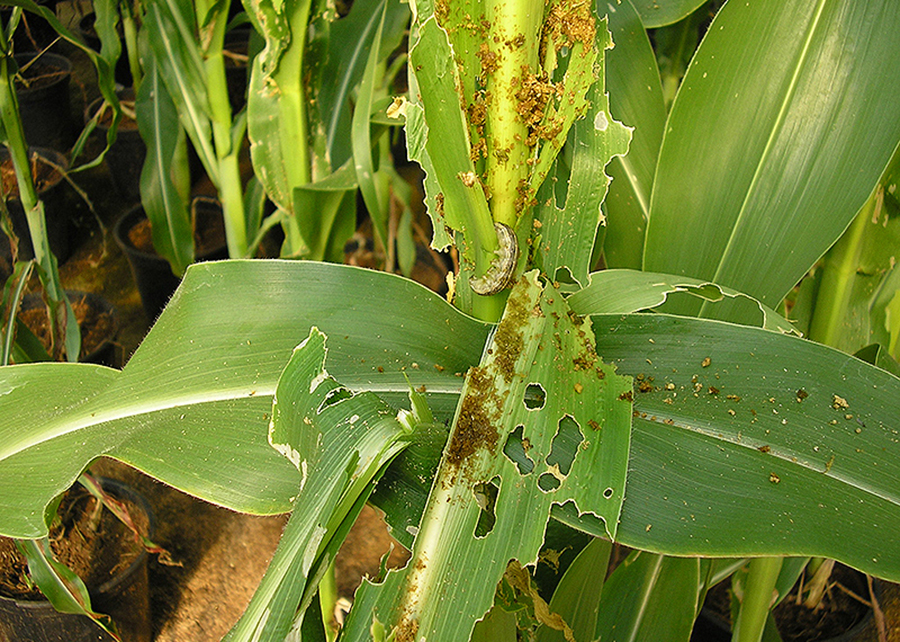
Research development: years of dedication
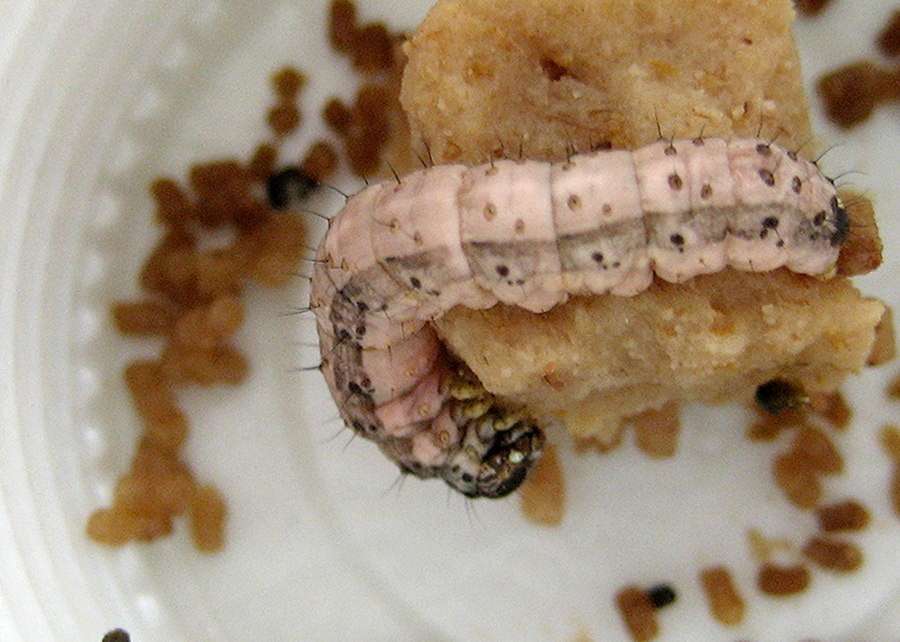 The identification of efficient baculovirus isolates, which act against Spodoptera frugiperda, began in the 1980s, when researchers started collecting caterpillars and carrying out surveys to identify diseased insects. “In order to produce a baculovirus-based insecticide, caterpillars must be collected in the field, and those that have symptoms of infection must be isolated and studied, one by one, in contrast with healthy caterpillars. The best isolates are dealt with and characterized in the laboratory using gene sequencing tools when necessary. The characterization of the isolates leads to the choice of the best strains and these ones will be worked on in terms of pilot production, formulation of the biological product, and field experiments”, reports Fernando Valicente.
The identification of efficient baculovirus isolates, which act against Spodoptera frugiperda, began in the 1980s, when researchers started collecting caterpillars and carrying out surveys to identify diseased insects. “In order to produce a baculovirus-based insecticide, caterpillars must be collected in the field, and those that have symptoms of infection must be isolated and studied, one by one, in contrast with healthy caterpillars. The best isolates are dealt with and characterized in the laboratory using gene sequencing tools when necessary. The characterization of the isolates leads to the choice of the best strains and these ones will be worked on in terms of pilot production, formulation of the biological product, and field experiments”, reports Fernando Valicente.
According to him, all the studies enabled the obtention of parameters for production. Healthy laboratory-bred caterpillars are used as hosts to multiply the virus and generate the product. “It’s been years of dedication, investment in research, laboratory experiments and field tests to make the product viable”, says the researcher. He says symptoms of baculovirus infection in caterpillars start with loss of appetite, reduced mobility, body discoloration, and finally death (picture above). In addition to its efficiency, the technology’s differentials are the low number of applications and the preservation of water sources and the pest natural enemies.
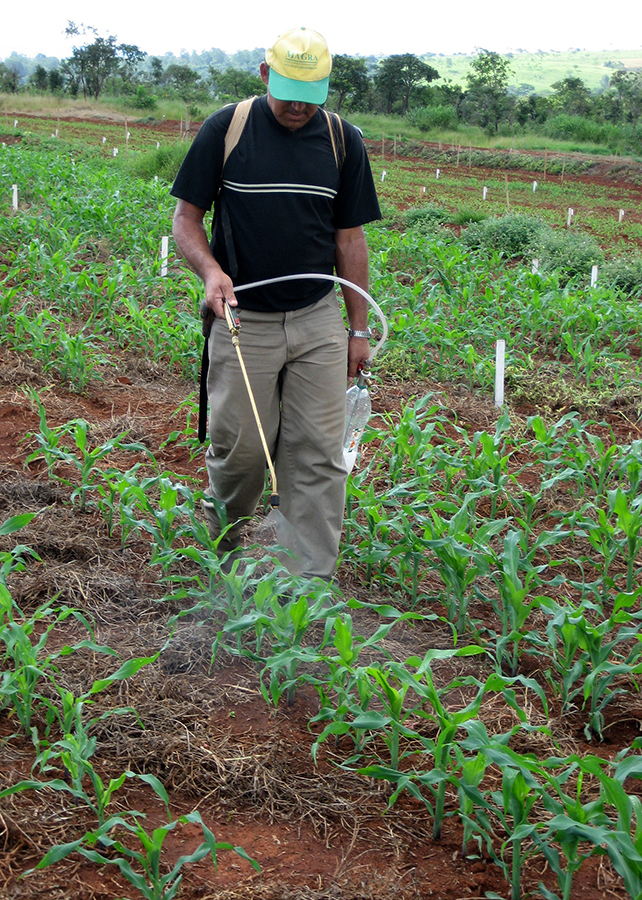 How to use Spodovir How to use Spodovir
Spodovir is sold in a wettable powder formulation, with a recommendation of 50 grams per hectare. Markus Ritter affirms that Andermatt has enough stock to cover 18,000 hectares in this first phase. According to him, the factory in Canada is fully operational and new volumes of the product will be imported. Following the dosage recommendation, one kilo of the product is enough for 20 hectares. The recommendation is to use Spodovir with a flat nozzle and the flow rate approved for conventional spraying between 100 liters to 120 liters per hectare, which can reach 150 liters per hectare and a minimum of 80 liters per hectare. Every application must include an adhesive spreader to improve the product adherence to the sprayed leaves, ensuring that the solution’s pH is between 5 and 7.2. There are spreaders in the market that maintain the pH of the mixture within this range, which facilitates its application in cotton crops. The technicians emphasize the abovementioned observations: it is important that the application considers the way the product works, i.e. ingestion by insects. Therefore, the ideal time for application is from 4 pm, when there is lower incidence of ultraviolet rays (which affect the bio-product), which prepares the leaves for the fall armyworm, which feeds at night. Spodovir What it is: Baculovirus-based biological product registered for the control of fall armyworm, Spodoptera frugiperda Where to find it: Andermatt Group Brasil - Curitiba, State of Paraná Phone numbers: +55 41 99113-8703 | +55 41 99164-7334 E-mail: info@andermatt.com.br Site: https://andermatt.com.br/ Grupo Andermatt Andermatt Biocontrol was created in Switzerland in 1988 aiming to offer biological alternatives for agriculture. The Andermatt Group is currently present in over 60 countries and is represented by branches, partners, or distributors. The group has a portfolio of more than 30 products. Headquartered in Curitiba, State of Paraná, Andermatt Brasil was created in 2014. Learn more about Embrapa’s Technology: Approved products - Ministry of Agriculture, Livestock and Supply website 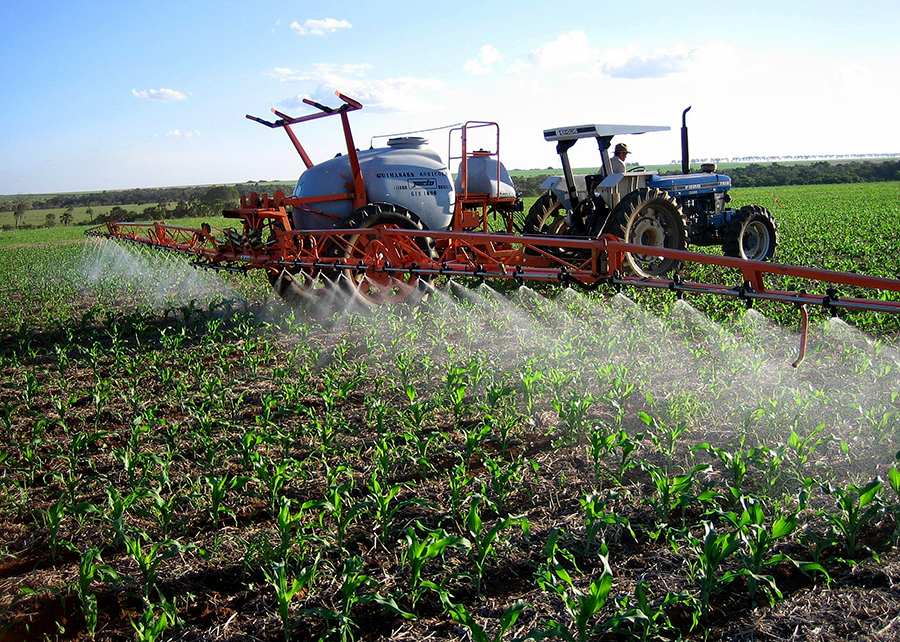
|
Guilherme Viana (MTb 06.566/MG)
Embrapa Maize and Sorghum
Press inquiries
milho-e-sorgo.imprensa@embrapa.br
Phone number: +55 31 3027-1905 | +55 31 9 9733-4373
Translation: Antonio Claudio da Silva Barros
Embrapa Maize and Sorghum
Copyediting: Mariana Medeiros (013044/DF)
General Secretariat
Further information on the topic
Citizen Attention Service (SAC)
www.embrapa.br/contact-us/sac/
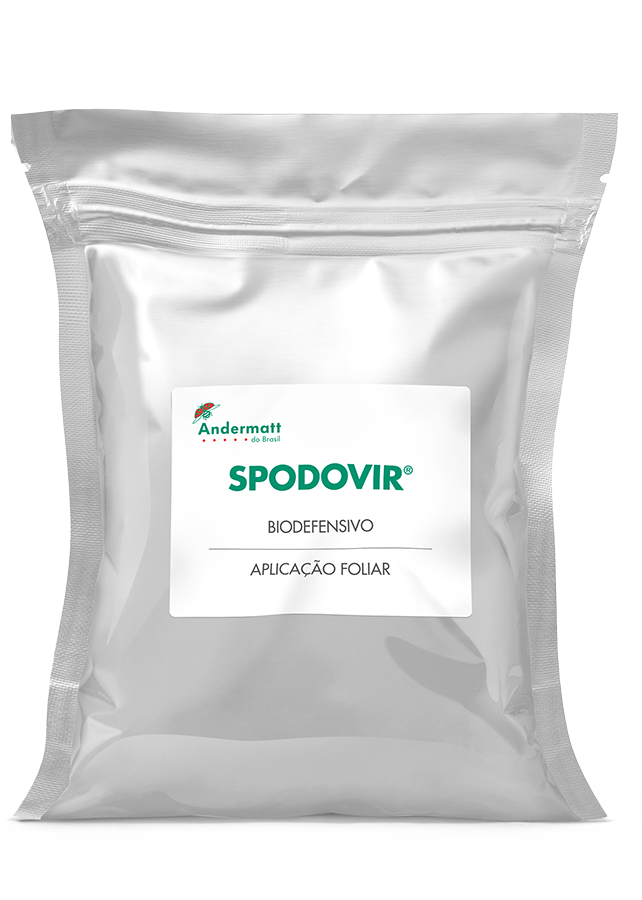
Agronomist engineer Viviane Dutra (right), responsible for the management of Andermatt Brasil, says that the cost of one application of the product per hectare would be approximately 0.75 sack of corn (considering, for example, the price of a sack of this cereal on June 10 at 96.57 reais, the corn grower would spend 72.42 reais per hectare). Besides, the cost to use Spodovir is equivalent to 0.45 sack of soybean (at a price of 167.62 reais on June 10). Thus, soybean growers would spend 75.42 reais per hectare to use the product.
The identification of efficient baculovirus isolates, which act against Spodoptera frugiperda, began in the 1980s, when researchers started collecting caterpillars and carrying out surveys to identify diseased insects. “In order to produce a baculovirus-based insecticide, caterpillars must be collected in the field, and those that have symptoms of infection must be isolated and studied, one by one, in contrast with healthy caterpillars. The best isolates are dealt with and characterized in the laboratory using gene sequencing tools when necessary. The characterization of the isolates leads to the choice of the best strains and these ones will be worked on in terms of pilot production, formulation of the biological product, and field experiments”, reports Fernando Valicente.

